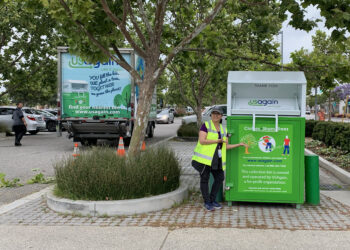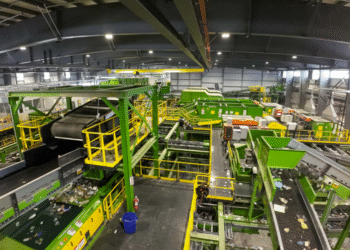The environmental organization’s “Forever Toxic” report, released today, brings together peer-reviewed studies from around the world to make claims about how chemicals in plastics, especially recycled plastics, affect human health and the environment.
The release comes roughly seven months after a separate Greenpeace report that alleged no plastics in the U.S. meet the definition of “recyclable.” That study garnered extensive mainstream media attention, though its methodology was criticized by Plastics Recycling Update.
A Greenpeace press release said the studies referenced in the toxicity report all point to the same conclusion: recycling increases the toxicity of plastics and that the upcoming global plastics agreement negotiations in Paris should focus on capping and phasing down plastic production, as well as regulating chemical additives.
“Plastics contain more than 13,000 chemicals, with more than 3,200 of them known to be hazardous to human health,” the study noted. “Moreover, many of the other chemicals in plastics have never been assessed and may also be toxic.”
The American Chemistry Council (ACC) issued a response to the study, noting the benefits plastics bring to society.
“If Greenpeace had its way, modern life would be dramatically different,” Joshua Baca, vice president of plastics at the American Chemistry Council, stated. “People across the world, particularly in developing countries, would have less access to clean drinking water, safe food supplies, sanitary medical and personal care products, and renewable energy.”
‘Don’t simply go away’
There are three main ways recycled plastics accumulate potentially hazardous chemicals, according to the Greenpeace report: direct contamination (that is, when the virgin plastic being recycled also contained the chemical), leaching and heating during the recycling process.
“For example, brominated dioxins are created when plastics containing brominated flame retardants are recycled, and a stabilizer used in plastic recycling can degrade to a highly toxic substance found in recycled plastics,” the report noted. “Sorting challenges and the presence of certain packaging components in sorted materials can also lead to toxicity in recycled plastic.”
While single-use food and beverage packaging does not contain brominated flame retardants, the report argues that such chemicals can be introduced into the recycling stream and end up in the resin.
Therese Karlsson, science advisor with the International Pollutants Elimination Network (IPEN), said in the press release that “plastics are made with toxic chemicals, and these chemicals don’t simply go away when plastics are recycled.”
“Real solutions to the plastics crisis will require global controls on chemicals in plastics and significant reductions in plastic production,” Karlsson added.
Greenpeace is calling on stakeholders that are part of the Intergovernmental Negotiating Committee on Plastic Pollution, which is set to meet later this week in Paris, to accelerate refill- and reuse-based systems without plastic.
Greenpeace also wants to see a cap on plastic production paired with a reduction of production and a just transition for workers in the plastics industry.
Remaining plastic stockpiles should be handled with non-combustion technologies , Greenpeace noted, and there should be extended producer responsibility on a wider scale. The agreement should also include stronger regulations on recycling facilities, require transparency about what chemicals are in plastics and push companies to eliminate all toxic additives and chemicals from plastics.
Baca from ACC disputed some of those strategies.
“The proposals in [Greenpeace] report would disrupt global supply chains, hinder sustainable development, and substitute plastics with materials that have a much higher carbon footprint in critical uses,” Baca noted.






























